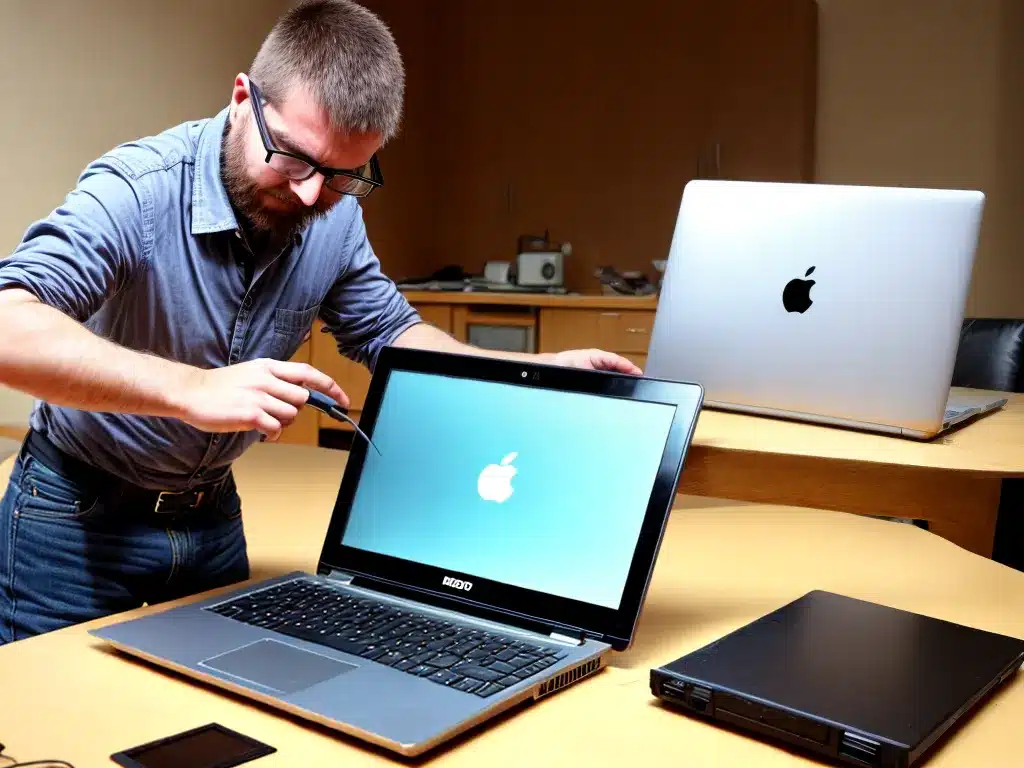
Having your laptop shut off randomly can be extremely frustrating. There are several potential causes for this issue, but thankfully there are also some steps you can take to try and fix it. Here is an in-depth guide on how to troubleshoot and repair a laptop that keeps shutting down unexpectedly.
Diagnose the Issue
The first step is to try and diagnose why your laptop is shutting off. Here are some of the most common causes:
Overheating
One of the most common reasons a laptop will shut off randomly is overheating. If the CPU or other components get too hot, the laptop will abruptly shut down as a failsafe to prevent damage.
To diagnose, pay attention to whether the laptop feels hot right before it shuts off. Also check if the fans are running loudly or not at all. Overheating can be caused by excessive CPU usage, dust buildup in the cooling vents, or simply an aging laptop.
Faulty RAM
Faulty RAM (memory) modules can also cause random shutoffs. RAM helps temporarily store data as your computer runs programs. If the RAM is faulty, it can cause system crashes and shutoffs.
To test this, run a RAM test utility like the Windows Memory Diagnostic tool. If it detects RAM errors, that may be the culprit.
Battery Issues
A dying battery or loose battery connection can prevent the laptop from getting consistent power, leading to shutdowns.
Inspect the battery visually for any damage or swelling. Check if the laptop works properly while plugged into AC power. If it only has issues while on battery, that points to a battery problem.
Power Issues
A faulty power supply/AC adapter or loose DC power jack can also cut power inconsistently and cause shutdowns.
Wiggle the power cable at the jack while your laptop is on and see if it abruptly shuts off. Also try using a different power adapter if possible to test.
Software/Driver Conflicts
Software or driver issues can sometimes manifest as random shutdowns, especially after a recent update or hardware change. Conflicts between software and drivers can cause the system to freeze or crash.
Try booting your laptop in safe mode to see if it still has issues. If the problem goes away in safe mode, that indicates a software or driver conflict.
Troubleshoot and Fix the Issue
Once you have a better idea of what could be causing your laptop to shut off randomly, here are some things you can try to fix it:
Clean the Inside
If overheating seems to be the culprit, thoroughly clean the inside of your laptop. Use compressed air to blow out any dust buildup in the ventilation ports and fans. You can also use a small vacuum attachment for hard to reach areas. Make sure all the fans are spinning properly and free of obstructions. Replacing the thermal paste on the CPU can also help lower temperatures.
Test and Replace RAM
If you suspect faulty RAM, run extended RAM test utilities like Windows Memory Diagnostic or MemTest86+. If errors are detected, replace the RAM sticks with new modules one at a time to isolate the bad stick(s). Install the new RAM properly by gently slotting it in completely until it clicks.
Calibrate or Replace Battery
For battery issues, first fully charge and calibrate the battery by completely draining and charging it a few times. If the battery no longer holds much charge or the laptop still randomly shuts down, you will likely need to replace it with a new battery. Make sure it is properly connected.
Check Power Jack and Adapter
If a faulty power supply/jack is the problem, wiggle the connector while running the laptop and see if it shuts off. Try a different power adapter if possible. If the jack itself seems damaged, you may need to replace the DC jack module inside the laptop. Take care not to damage the motherboard when doing repairs.
Update Drivers and Roll Back Changes
For software/driver related shutdowns, make sure all your drivers and Windows are fully updated. Try uninstalling any recently added programs or drivers that could be conflicting. Reinstalling or rolling back drivers in Device Manager may help. A clean reinstall of Windows is also an option if necessary.
Preventative Measures
Here are some tips to help prevent random laptop shutdowns going forward:
- Keep the inside clean and dust-free
- Place the laptop on a hard flat surface for ventilation
- Avoid blocking the air vents while using it
- Don’t let the laptop overheat, use a cooling pad if needed
- Check for driver and software updates regularly
- Only install apps and updates from trusted sources
- Replace the battery every 2-3 years
- Be gentle with connectors and ports
With some targeted troubleshooting and these preventative measures, you should be able to resolve random laptop shutdowns and keep your device running smoothly. Let me know if the issue persists or you have any other questions!












